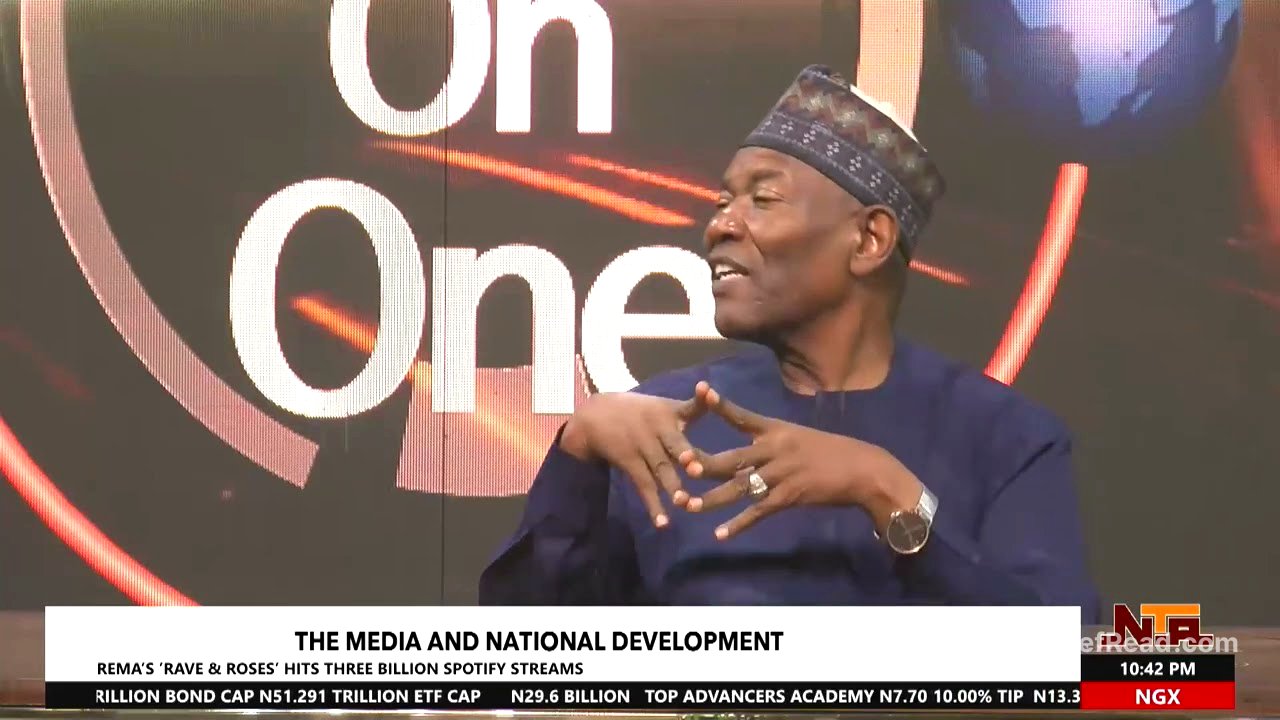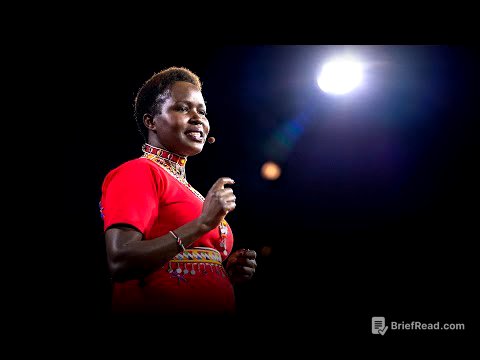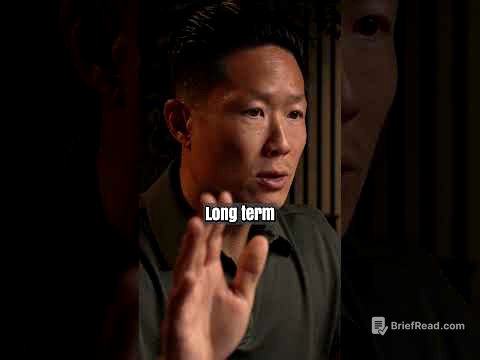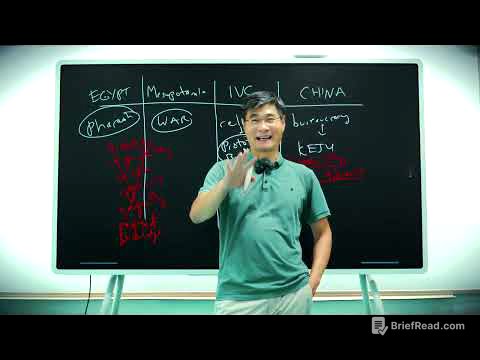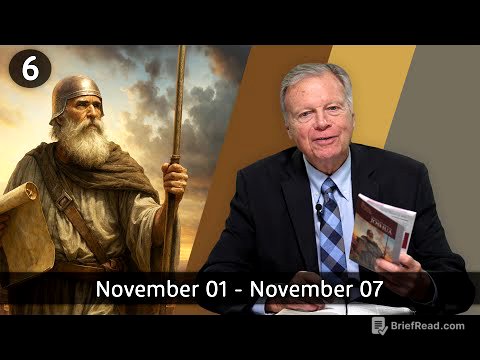TLDR;
This episode of One on One features Professor Umaru Alaji Pati, Vice Chancellor of the Federal University of Kasher and President of the Society of Nigerian Broadcasters, discussing the Nigerian media's role in national development. The conversation covers the media's historical evolution, its impact on national unity and development, the challenges posed by digital media and fake news, the importance of media literacy, and the future of broadcasting in Nigeria.
- The Nigerian media has played a significant role in national development since pre-independence.
- Digital media and social media present challenges like the spread of misinformation and hate speech.
- Media literacy and critical thinking are essential for navigating the modern media landscape.
- Technology is a crucial factor in media development, requiring continuous innovation and adaptation.
- The Society of Nigerian Broadcasters aims to equip broadcasters to serve the interests of Nigeria effectively.
Introduction [0:00]
The host introduces Professor Umaru Alaji Pati, highlighting his extensive background in mass communication, broadcasting, and academia. The program aims to discuss the media's role in national development, its evolution, and current challenges.
The Nigerian Media: Evolution and Role [1:56]
Professor Pati asserts that the Nigerian media has significantly contributed to the country's growth and development, reflecting societal happenings, aspirations, and fears. He notes that the media's shortcomings mirror broader societal issues like ethnicism, religious bias, and corruption, emphasizing that the media is an integral part of Nigerian society and its content reflects daily events.
Pre-Independence Patriotism vs. Post-Independence Challenges [4:04]
Before independence, the media was united against the colonial master, but post-independence, regional and political party interests led to divisions. Politicians influenced media through ownership, leading to biased reporting and contributing to national crises. While acknowledging the media's role, Professor Pati argues that it merely reflects the interests of its owners, calling for a common interest in Nigeria's unity, development, and prosperity.
Federalism, Diversity, and National Unity [7:22]
Nigeria's federal structure and diverse nature lead to tensions over resource and power control, reflected in varied opinions and promotion of sectional interests over national ones. The absence of a unifying ideology and intra-elite conflicts hinder national unity. The rise of digital media exacerbates this, with unregulated online content promoting divisive sentiments.
Advantages and Disadvantages of the Internet [9:30]
The internet has democratized access to information but also poses challenges due to the difficulty in controlling content. The solution lies in promoting media literacy to foster critical thinking and encouraging a sense of national unity. The educational system plays a crucial role in shaping minds and promoting understanding of Nigeria.
Media Literacy and Critical Thinking [11:46]
Nigeria faces significant challenges in media literacy due to its large population, varying literacy levels, and economic issues. Promoting critical thinking is essential to help people discern truth from misinformation, especially on social media. Fake news has fueled ethnic conflicts, highlighting the need for individuals to question information and avoid ethnicizing, religionizing, or politicizing issues without proper understanding.
Objectivity, Credibility, and Perception in Media [14:36]
Complete objectivity may be unattainable, but intellectual honesty and universal points of agreement are crucial. Credibility in communication depends on truthfulness, relevance, competence, and dynamism, influencing believability. Nigerians consider factors like religion, ethnicity, location, and economic status when assessing information credibility, reflecting a general distrust of the elite.
Quality of Media Practitioners: Past vs. Present [18:34]
While some romanticize the past, Professor Pati argues that the present media landscape differs significantly due to increased quantity and contending interests. The number of media outlets and practitioners has grown exponentially since independence. The expansion without a focus on quality has led to challenges, including the proliferation of fake journalists and the misuse of social media, which has become a primary source of disinformation and hate speech.
Preparation for the Digital Age [22:13]
Nigeria launched into the digital age with limited preparation, leading to the misuse of communication technologies for destruction and division. While these tools offer global standards for good, their negative use is a problem. Regulation is difficult due to the rapid evolution of technology. The focus should be on innovation and mastering these technologies to ensure participation in the global evolution.
The Role of Universities and Educational Institutions [25:21]
Educational institutions, including universities and polytechnics, must adapt to the evolving job market influenced by the internet, robotics, and AI. They should train students to be flexible and adaptable, focusing on innovation and dismantling anti-intellectual elements. Universities need to provide 24-hour access to laboratories and libraries to foster innovation.
Technology as the Most Important Currency [28:58]
Technology is the most important currency in media development, driving advancements from the printing press to radio, television, and the internet. Political will and commitment are essential for technology to thrive, impacting universities and society. The internet has led to convergence, threatening traditional media and creating a need for platforms.
AI and its Impact on Knowledge and Intellect [34:01]
Professor Pati disagrees that AI is entirely anti-intellectual, viewing it as a tool that can be used positively or negatively. AI answers questions but lacks context and human emotion. He emphasizes the need to innovate and adapt to these technologies, training students in their ethical use. Kasher University is introducing courses in AI and ethics to equip students with the necessary skills.
The Evolving Role of Teaching and Learning with AI [37:28]
AI makes teaching and learning easier by improving efficiency and adding quality. Lecturers need to change their perceptions and embrace digital tools. Governments must create the necessary infrastructure to support these technologies in educational institutions. AI can assist and facilitate learning but cannot replace human emotion or provide context.
Challenges of Fake News and Impersonation [39:04]
The internet has democratized access to information, but many do not understand the difference between information and communication. Cheap data and Android phones can be used to spread misinformation, leading to confusion and loss. Critical thinking and education are essential to equip people with the skills to differentiate between truth and falsehood.
The Impact of Security and Economic Situations on National Unity [42:22]
Security and economic challenges have reduced interaction among Nigerians, leading to increased division and hatred. People no longer travel or interact in schools, exacerbating misunderstandings and empathy. The segmentation of schools based on wealth and religion further hinders national unity.
Media's Role in Reporting Sensitive Issues [46:06]
The media's role in reporting sensitive issues is crucial, but it must be balanced with patriotism. Excesses exist not only in the media but also in politics, economics, and the civil service. Media outlets are often agents of certain interests, reflecting societal divisions.
The Society of Nigerian Broadcasters and the Future of Broadcasting [47:31]
The future of broadcasting remains bright due to the increasing preference for video and audio content. However, broadcasters must adapt to the challenges posed by the internet and podcast platforms. The Society of Nigerian Broadcasters focuses on capacity building, technology, content, credibility, freedom, safety, and competitiveness. The goal is to ensure that Nigerian broadcasters are well-equipped to serve the interests of Nigeria and remain relevant.
Trends in Broadcasting and Ethical Considerations [51:19]
Broadcasting should maintain decorum, knowledge, and courtesy. Broadcasters should respect their interviewees and allow them to express their opinions. Ethics, responsibility, and respect for the audience are paramount.
Freedom of the Nigerian Press [53:21]
The freedom of the Nigerian press is relative and contextual, influenced by economic depression, illiteracy, hunger, and systemic challenges. True freedom requires liberation from these constraints, impacting both journalists and the general population.
